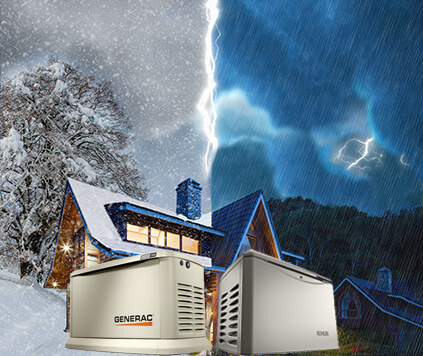Lights Out – What now? Let’s Discuss Back up Generators
Okay, so the lights went out and it’s kinda fun for a few minutes, as you scramble to light your candles and find your flashlights, but now you realize that this power outage could last a while. What if your family starts to get cold? What if you can’t cook? What if your food spoils? What if, what if, what if? I think everyone in the Houston area has experienced this moment of pause.
When this happens and people get uncomfortable, most Houston Residents start to call friends and family. They go to their friends or family’s homes across town (if they still have power). Multi Family living ensues and then things get REAL. What if they had their own form of backup power during this power outage?
Should you look into backup generators?
These backup power units are also known as standby generators. Maybe you could just run over to Suzy’s house (45 minutes away) for a shower, put your refrigerator items in the garage, and cook on the barbeque… yes, there are all sorts of ways to weather the storm or the outage, but then you get to thinking – I don’t want to go through all of this in the future. The good news is, this article will discuss the pros and cons of Backup Generators. We will discuss Automatic Backup Generators versus Portable Generators.
First, the Home Standby Generator – the solution to any power outage
Consider this, an automatic standby generator is a back-up electrical system that operates whether you are home or away. Within seconds of a power outage, it automatically supplies power directly to your home’s electrical circuit breaker box.
After utility power returns, the generator shuts itself off (with a built in transfer switch) and waits for the next outage. It operates on natural gas or liquid propane gas and sits outside just like a central air conditioning unit. Oh, yeah, this is the way to prevent unexpected sleepovers at your in-laws, days without showers, and backyard breakfast barbeques. Here is the short list of benefits to consider.
The Automatic Standby Generator Solution:
- Operational Convenience & Automatic Functionality: An automatic standby generator operates seamlessly with it’s very own transfer switch – supplying power to your home’s electrical system within seconds of a power outage, whether you’re at home or away.
- Hands-Free Operation: After utility power is restored, the generator automatically shuts off, eliminating the need for manual intervention.
- Fuel Efficiency and Safety: Choose Natural Gas or Propane. Typically, powered by natural gas or liquid propane, standby generators are more cost-effective and safer than portable generators using gasoline.
- Reduced Risks: Unlike portable generators, which pose a risk of carbon monoxide poisoning, standby generators are a safer for of backup power since they are installed outdoors, preventing exposure to dangerous fumes.
- Quiet and Discreet: Low Noise Levels – Standby generators operate quietly, in stark contrast to the noisy nature of many portable generators, ensuring a peaceful environment during power outages.
- Higher Power Output: Standby generators provide ample power to support most household appliances simultaneously, offering a whole house solution compared to the limited capacity of portable generators.
Automatic standby generators are the VIPs of the generator world.
Whole Home Standby Generators kick in automatically, run on natural gas or propane, and are a discreet outdoor appliance that stands in waiting for it’s moment to serve. No more fumbling with extension cords, fuel or fumes in the dark. An automatic standby generator that is safely installed outside your home prevents your family from exposure to the deadly carbon monoxide poisoning that is a much greater risk with portable generators (You may want to tell Wilson about that). Oh, and have you noticed that Wilson’s portable generator is quite noisy?
More importantly, the automatic backup generator runs on your home’s natural gas or LP fuel supply, it is less expensive to run than gasoline and does not need to be refilled. What makes them even better is, they are programmed to start automatically within seconds of a power outage and eliminate the need to haul a portable generator outside or run extension cords throughout your home. Talk about a smart home, these automatic standby generators are ready 24/7 – whether you’re home or away. They even turn themselves off when utility power returns, so there is no need to monitor the unit during an outage. You’ll be able to carry on without stressing about whose house you need to stay at to be comfortable.
Couldn’t I just buy a Portable Generator?
Aren’t portable generators just as good? My neighbor Wilson has one. The short answer is yes, you could buy portable power, but there are some drastic differences between an automatic standby generator and a portable backup generator. Portable generators are like that one friend who volunteers to help you move and then mysteriously develops a bad back on moving day. They require manual setup, constant refueling, and sound like a lawnmower on steroids. Portable generators typically only provide backup power a few items at a time while a standby generator has a higher output and can take care of most of your home. Let’s compare the two options.
Portable vs. Standby Generators:
- Manual vs. Automatic Setup:
- Portable: Require manual setup, constant refueling, and manual intervention during power restoration.
- Standby: Automatically kick in, eliminating the need for manual efforts and ensuring uninterrupted power supply.
- Fuel Source and Efficiency:
- Portable: Often run on gasoline, requiring frequent refueling and posing safety risks.
- Standby: Run on natural gas or propane, reducing operational costs and enhancing safety. Natural gas is frequently already plumbed into most homes.
- Noise Level:
- Portable: Known for loud operation, potentially causing disturbances in the neighborhood.
- Standby: Operate quietly, maintaining a peaceful environment even during prolonged outages.
How do I pick the right Standby Generator for my home?
Investing in a backup generator is a smart move to ensure your home remains powered up when the grid goes down. In this summary, we’ll delve into the workings of generators, discuss their benefits, and provide insights into power output comparisons so you can make an informed decision.
Understanding How Generators Work:
Types of Generators:
- Standby Generators: Permanently installed and connected to your home’s electrical system, these generators automatically kick in when the power goes out.
- Portable Generators: These versatile units are movable and can power selected appliances through extension cords during an outage.
Power Source:
- Gasoline Generators: Commonly used for portable units, gasoline generators are easy to refuel but may have limited runtime.
- Propane Generators: A cleaner-burning option, propane generators provide a reliable fuel source and longer shelf life. Natural gas can also be less expensive.
- Diesel Generators: Known for fuel efficiency, diesel generators are suitable for longer outages but may require professional installation.
Transfer Switch:
- Critical Component: A transfer switch ensures a smooth transition between grid power and generator power, preventing back feeding and protecting appliances.
Benefits of Backup Generators:
- Continuous Power Supply:
- Avoid Disruptions: Standby generators provide seamless power, allowing you to maintain essential services such as refrigeration, heating, and medical equipment.
- Increased Home Value:
- Attractive Feature: A home equipped with a standby generator becomes more marketable, offering potential buyers a valuable asset.
Power Output Comparisons:
- Wattage Considerations: Matching needs – Evaluate your household’s power consumption and choose a generator with sufficient wattage to cover essential appliances.
- Common Appliances: Understand the power requirements of common household appliances to make an informed decision.
Generator Sizing:
- Oversizing vs. Undersizing: Oversized generators may be less efficient, while undersized ones risk overloading during peak demand. Calculate your power needs accurately to choose the right size.
Fuel Efficiency:
- Consider fuel consumption rates to find a generator that balances power output with efficiency.
Stay comfortable, Eliminate Stress – Get an automatic standby generator or stay at Wilson’s house?
Investing in a backup generator for your home is a smart, proactive step to surviving Houston power outages. Installing one of these units ensures your family’s safety and comfort during unexpected disruptions. Now that you know how generators work and understand the power output options, you can make an informed decision that meets your specific needs. Stay prepared and empowered, even when the lights go out. Explore your options at Quality Home Products of Texas today!


